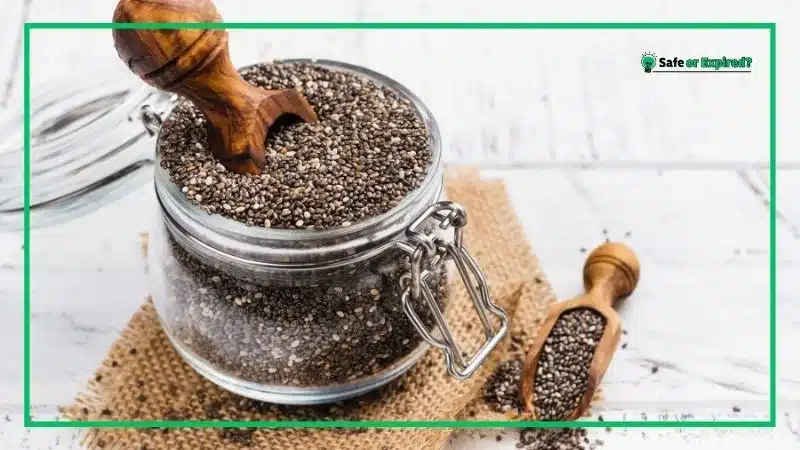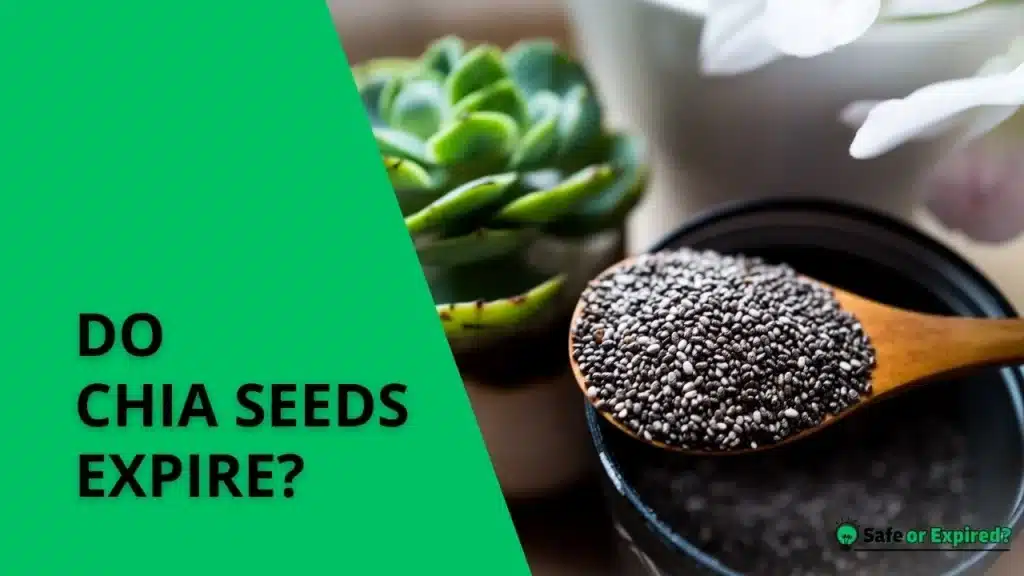“Do chia seeds expire?” is a popular search term for food preservation tips. Yes, they do get spoiled, and you should be able to tell when. In this article, I’ll show you how to tell if your chia seeds have gone bad and what will happen when you eat the expired ones. Stick around for some surprising facts about these tiny superfoods!
Do Chia Seeds Expire? Here’s What to Know
Yes, chia seeds can expire, but they have a long shelf life. When stored properly in a dry place, they can last up to two years past the packaging date. To determine if they have gone bad, look for spoilage signs like a rancid smell.
Remember that proper storage in an airtight container can extend their freshness, ensuring they remain safe to eat.
Do Chia Seeds Expire in the Fridge?
Storing chia seeds in the fridge can extend their shelf life. In a cool, dry environment like the refrigerator, chia seeds can last for up to three years. Refrigeration helps prevent the oils in the seeds from turning rancid.
Ensure they are stored in an airtight container to avoid moisture absorption and contamination, which can lead to spoilage.
Do Chia Seeds Expire if Not Refrigerated?
Chia seeds do not need to be refrigerated to remain fresh. When stored in a dry and dark place, such as a pantry, they can last a couple of years. Proper storage in an airtight container is crucial to protect them from moisture and pests.
Although refrigeration is not necessary, it can help prolong their shelf life.
Do Chia Seeds Expire After Opening?
Once opened, chia seeds can still last a long time if stored properly. If you prefer, you can also refrigerate them to extend their shelf life even further. Always check for signs of spoilage before use so that you don’t end up eating the bad ones.
How Long Do Chia Seeds Expire?
Chia seeds can last up to two years when stored in a dry place and up to three years if kept in the fridge. Freezing can extend their shelf life to five years. Always store them in an airtight container to maintain freshness and check for signs of spoilage before use.
How Long Do Chia Seeds Last in Water

Chia seeds soaked in water can last up to five days in the refrigerator. Soaking them enhances their nutrient absorption and creates a gel-like texture. However, if left out at room temperature, they should be consumed within a few hours to prevent bacterial growth.
How Long Do Chia Seeds Last in the Fridge
In the fridge, dry chia seeds can last up to three years when stored in an airtight container. The cool temperature slows down the oxidation process, preventing the oils in the seeds from turning rancid and extending their shelf life.
How Long Do Chia Seeds Last in the Freezer
Chia seeds can last up to five years in the freezer. Freezing them halts the oxidation process almost entirely, preserving their freshness and nutritional value. Ensure they are stored in an airtight container or freezer bag to protect them from moisture and freezer burn.
How Long Do Chia Seeds Last on the Counter
On the counter, in a cool, dry place, chia seeds can last up to two years. It’s essential to store them in an airtight container away from direct sunlight and heat sources to maintain their quality and prevent spoilage.
Here’s a chia seeds shelf life table to sum everything up.
| Storage Method | Opened Chia Seeds | Unopened Chia Seeds |
| Water | 5 days in the fridge | Not applicable |
| Fridge | Up to 3 years | Up to 3 years |
| Freezer | Up to 5 years | Up to 5 years |
| Counter | Up to 2 years | Up to 2 years |
How To Know if Chia Seeds Have Gone Bad?
To know if chia seeds have gone bad, check for a rancid smell, bitter taste, changes in color, or mold. Fresh chia seeds have a mild, nutty flavor and no noticeable smell. Proper storage in a cool, dry place can help maintain their freshness.
Rancid Smell
If your chia seeds smell bad, like old oil or paint, they are probably rancid. Fresh chia seeds should have no smell at all. Rancid seeds have spoiled oils that can make them unhealthy to eat. This smell is a clear sign that your seeds have gone bad and should be thrown away.
Bitter Taste
Chia seeds usually have a mild, nutty taste. If they taste bitter or off, it’s a sign they have spoiled. When the oils in the seeds go bad, the taste changes. Always taste a small amount if you are unsure. If they taste bad, it’s best to toss them out to avoid any risk of sickness.
Changes in Color
Chia seeds should be black or white. If you see a different color, it might mean they are bad. A change in color can happen if they get too old or are not stored right. This can make them unsafe to eat. Always check the color before using your chia seeds to ensure they are still good.
Mold
Mold is a clear sign that chia seeds have gone bad. If you see any fuzzy spots or unusual growth on the seeds, do not eat them. Mold can be harmful to your health. Keeping your chia seeds dry and in a cool place helps prevent mold from growing. Always ensure the chia seeds are top-notch before you consume them.
Here’s a picture of good-quality seeds as a reference:

Can You Eat Chia Seeds Past the Expiration Date?
Yes, you can eat chia seeds past the expiration date if they show no signs of spoilage like a rancid smell, bitter taste, color changes, or mold. Properly stored chia seeds can last much longer than their expiration date.
However, always check their quality before consuming to ensure they are still safe to eat.
Can Bad Chia Seeds Make You Sick?
Yes, bad chia seeds can make you sick. Eating spoiled chia seeds can lead to food poisoning with symptoms like stomach pain, nausea, vomiting, and diarrhea. Always check for signs of spoilage, such as a rancid smell, bitter taste, color changes, or mold, before consuming chia seeds.
Stomach Pain
Eating bad chia seeds can cause stomach pain. When chia seeds go bad, they can grow harmful bacteria or mold that irritates your stomach. You might feel cramps or discomfort after eating spoiled seeds.
To avoid this, always check the freshness of your chia seeds before eating them.
Nausea
Nausea is a common sign of food poisoning from bad chia seeds. If the seeds are rancid or contaminated, they can make you feel like you need to throw up. This happens because your body is trying to get rid of the spoiled food. Make sure to store chia seeds properly to keep them fresh and avoid feeling sick.
Vomiting
Vomiting can occur if you eat spoiled chia seeds. When your body detects something harmful, like bad chia seeds, it tries to get rid of it quickly by making you throw up. This is your body’s way of protecting you from harmful bacteria or mold. Always check for any signs of spoilage before consuming chia seeds.
Diarrhea
Diarrhea is another symptom of eating bad chia seeds. Spoiled seeds can contain bacteria or mold that upset your digestive system, leading to frequent, watery stools. This can be very uncomfortable and dehydrating.
To prevent this, ensure your chia seeds are stored in a cool, dry place and check for signs of spoilage before use.
Do Chia Pet Seeds Expire?
Yes, Chia Pet seeds do expire, but they can last for several years if stored properly. To ensure their longevity, keep the seeds in a cool, dry place. Over time, the seeds may lose their ability to sprout effectively.
Always check the packaging for an expiration date and test a small batch if you’re unsure about their viability.
Conclusion
In summary:
- Chia seeds can expire but last up to two years if stored properly.
- Check for a rancid smell, bitter taste, color changes, or mold to know if they’ve gone bad.
- Proper storage in a cool, dry place extends their shelf life.
- Bad chia seeds can cause stomach pain, nausea, vomiting, and diarrhea.
- Chia Pet seeds also expire and show similar signs of spoilage.
Keeping your chia seeds fresh is easy with the right storage and a bit of attention. Enjoy your superfoods at their best!

